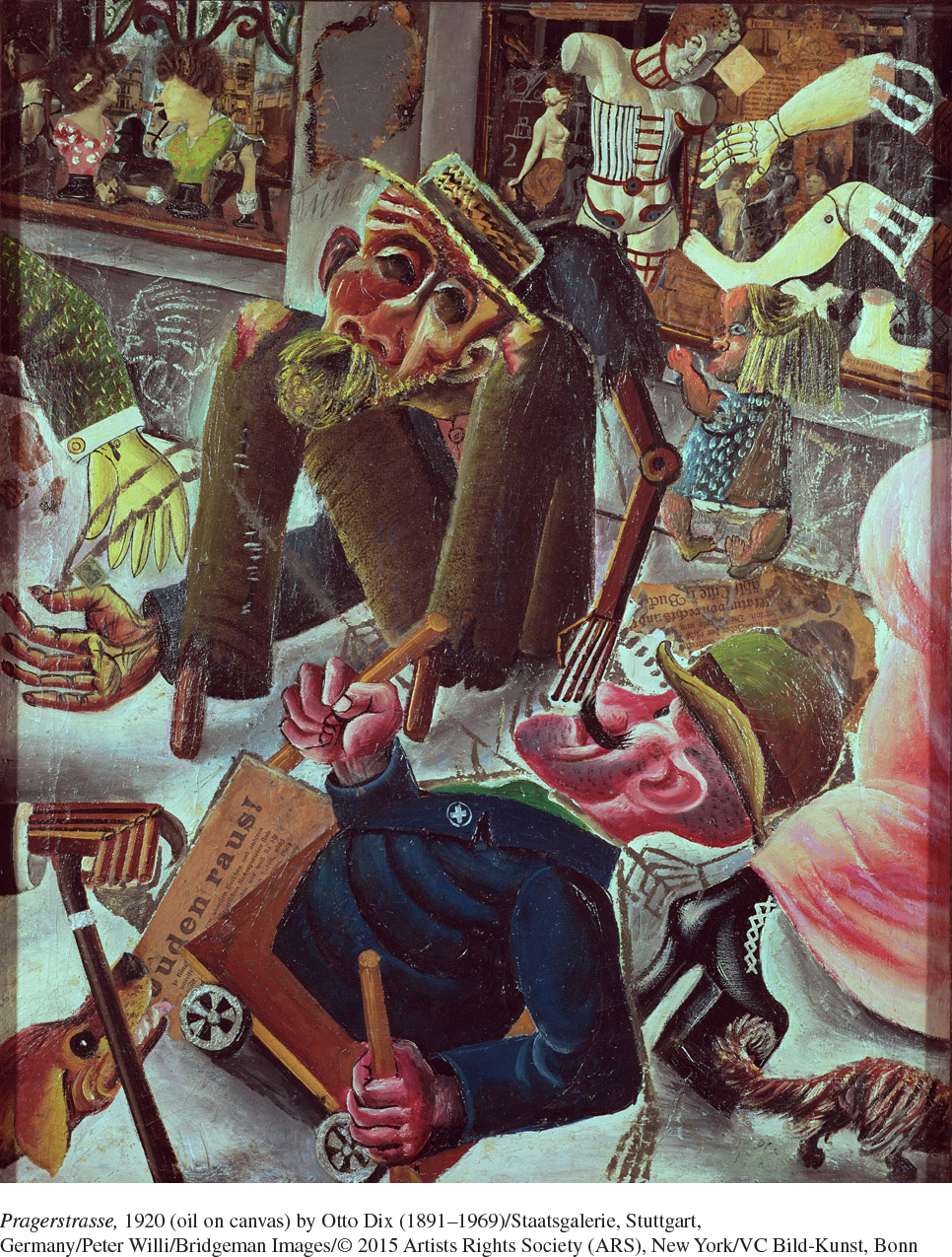Sources 20.3: In the Aftermath of the Great War
Beyond the enormous political, social, and economic changes wrought by World War I lay those transformations of consciousness, outlook, and expectation that registered in the work of artists and writers as well as in the sensibilities of individual people. This set of sources illustrates some of those changes.
Among the many outcomes of the Great War was the presence in every European country of disillusioned, maimed, and disfigured veterans, many of them literally “men without faces.” For some intellectuals and artists, they represented the fundamentally flawed civilization that had given rise to such carnage. Often neglected or overlooked, such men were reminders of a terrible past that others wanted to forget. The German artist Otto Dix (1891–
Source 20.3B derives from the most famous novel to emerge from the war. Written by the German war veteran Erich Maria Remarque, All Quiet on the Western Front describes the experience of a young German soldier and his classmates during the war. Published in 1929, it captured the sense of disillusionment and hopelessness that many returning veterans surely felt as they reentered civilian society. In Source 20.3C, a very different sense of self that derived from the war found expression in the recollections of an African veteran from Senegal, then a French colony in West Africa.
Questions to consider as you examine the source:
- How does the painting in Source 20.3A describe the situation of the veterans? Notice the leaflet on the skateboard of the legless veteran at the bottom. It reads “Juden raus” (Jews out). What does this suggest about the political views of these men? What do the images in the store windows suggest?
- How does Remarque in Source 20.3B describe the sensibility of those soldiers about to return to ordinary life? In describing the purpose of his book, Remarque wrote: “It will try simply to tell of a generation of men who, even though they may have escaped its shells, were destroyed by the war.” How does the excerpt in Source 20.3B reflect that purpose?
- How had the war changed the self-
image of the Senegalese soldier in Source 20.3C? And how had it altered his standing within his own society and in relationship to Europeans? How and why was his experience so different from that described in Remarque’s novel in Source 20.3B?
Source 20.3A
Otto Dix
Prague Street, 1920

Source 20.3B
Erich Maria Remarque
All Quiet on the Western Front, 1929
Had we returned home in 1916, out of the suffering and the strength of our experiences we might have unleashed a storm. Now if we go back we will be weary, broken, burnt out, rootless, and without hope. We will not be able to find our way anymore.
And men will not understand us, for the generation that grew up before us, though it has passed these years with us, already had a home and a calling; now it will return to its old occupations, and the war will be forgotten; and the generation that has grown up after us will be strange to us and push us aside. We will be superfluous even to ourselves, we will grow older, a few will adapt themselves, some others will merely submit, and most will be bewildered; the years will pass by and in the end we shall fall into ruin.
But perhaps all this that I think is mere melancholy and dismay, which will fly away as the dust, when I stand once again beneath the poplars and listen to the rustling of their leaves. It cannot be that it has gone, the yearning that made our blood unquiet, the unknown, the perplexing, the oncoming things, the thousand faces of the future, the melodies from dreams and from books, the whispers and divinations of women; it cannot be that this has vanished in bombardment, in despair, in brothels. . . .
I stand up. I am very quiet. Let the months and years come, they can take nothing from me, they can take nothing more. I am so alone, and so without hope that I can confront them without fear.
Source: Erich Maria Remarque, All Quiet on the Western Front, translated by A. W. Wheen (New York: Ballantine Books, 1982), 293–
Source 20.3C
Nar Diouf
A Senegalese Veteran’s Oral Testimony, 1919
I received many lasting things from the war. I demonstrated my dignity and courage, and [I] won the respect of the people and the [colonial] government. And whenever the people of the village had something to contest [with the French] — and they didn’t dare do it [themselves] because they were afraid of them — I used to do it for them. And many times when people had problems with the government, I used to go with my decorations and arrange the situation for [them]. Because whenever the Tubabs [Europeans] saw your decorations, they knew that they [were dealing with] a very important person. . . .
[For example], one day a Tubab came here [to the village] — . . .
Source: Joe Lunn, Memories of the Maelstrom: A Senegalese Oral History of the First World War (Portsmouth, NH: Heinemann, 1999), 232. Used by permission of the author.